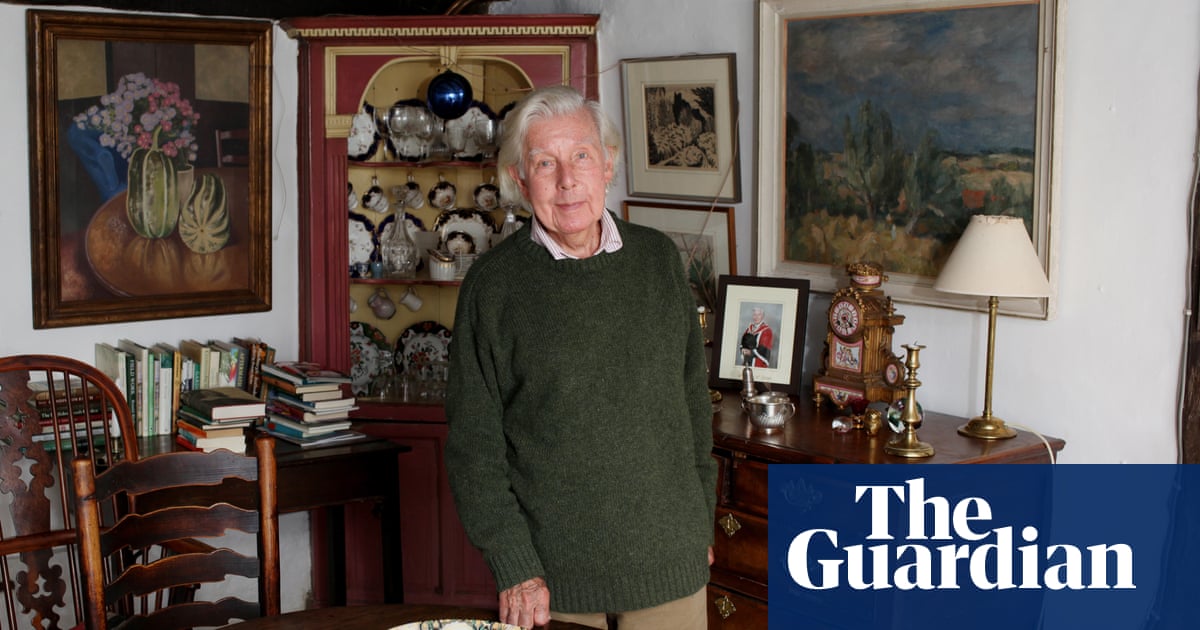Ronald Blythe is most acclaimed for Akenfield, his 1969 portrait of an English village from the late 19th century onwards. Latterly, the saintly author, who lived hermit-like in a remote farmhouse, was revered for his poetic, and profound writing about rural life. In several million published words, Ronnie – as he was affectionately known – could be personal but never revealed his relationships or anything remotely raunchy.
So it is unexpected to find this definitive biography, which spans the 10 decades of Blythe’s life, fairly steaming with sex. There are early adventures in a haystack; “some of the best sex ever” with fellow second world war conscripts; seduction by a jeweller from Bath in a Cornish field lit by glowworms; and casual assignations with everyone from a “blonde Adonis” of a civil servant to a notoriously slothful 21-stone rector.
Later, as Blythe traced a path from a job in Colchester library towards writerly freedom, his sexual encounters involved Arthur Lett-Haines, artist and partner of the painter Cedric Morris; the writer James Hamilton-Paterson; and experimental nights with lesbian crime writer Patricia Highsmith. Blythe’s letters to Highsmith revealed other flings, including with a poet from Barbados who transfixed Ronnie with his physical “perfection”. Even when Blythe lived a solitary later life at Bottengoms, the ancient farmhouse he inherited from his friends John and Christine Nash, unlikely opportunities arose, including a dalliance with the stand-in postman.
In another’s hands, this promiscuity might be sensationalist or spark prurient judgments, but it is sensitively treated by Ian Collins, a biographer who was also a close friend (but not a lover). What emerges is an unusually intimate and affectionate portrait.
Blythe may not have been out in public – and homosexuality remained illegal in England until he was nearly 45 – but he “regarded sexuality as a fact of life to be accepted and enjoyed”. While he discussed his romances with Collins in old age, he was less willing to reveal the abject poverty of his early childhood. When he found fame after the publication of Akenfield, he would vaguely say – in aristocratic tones bearing no trace of his Suffolk accent – that he came from “an old farming family”.
In fact, he was the eldest of six surviving children of Tilly, a London nurse and Albert, a Suffolk labourer who endured Gallipoli and other wartime horrors. Blythe shared a bed in their tiny cottage with a younger brother until he left home. The family were so poor that cousins brought straw for their mattresses. Blythe, sturdy but effete, left school at 14. Further education was out of the question.
Collins superbly marshals a mountain of information from an epic life into often droll stories about the miracle of Blythe’s escape to earn a living through his writing. His crucial step from voracious reader-and-dreamer to writer was finding his bohemian adopted “family” of East Anglian artists through his library job. Vital friendships came in the form of poet James Turner (rendered a rather narcissistic homophobe in Collins’s telling) and the (much more sympathetic) “mother‑confessor” Christine Nash.
There is an absence of anguish – in Blythe’s worldview did all those affairs really involve no bruising, no broken hearts? His later reminiscences are well-mined by Collins but, in many cases, they are all we have – recollections smoothed over with age. Survivors write their own history. So glimpses of alternative Ronnies are welcome: stoic Christine Nash complains of being unable to escape Blythe’s moaning and love quests; Hamilton-Paterson critiques his depictions of a rural world “which scarcely allows itself to be seen unless within the hermetic bounds of famous dead people’s eyes and ears”.
Blythe’s gentle, loving spirit inspired a battalion of protective “dear ones” who helped him live and die at home. But this warm biography touches its subject’s inner steeliness too: the needy hearts of others were viewed as a distraction from the essential life-task of writing. When a grieving Julia Blackburn sought comfort in her friend, Blythe explained “with a sort of determined finality that he had never loved anyone enough to feel the pain of loss”.
after newsletter promotion
Blythe Spirit: The Remarkable Life of Ronald Blythe by Ian Collins is published by John Murray (£25). To support the Guardian and the Observer order your copy from guardianbookshop.com. Delivery charges may apply.
